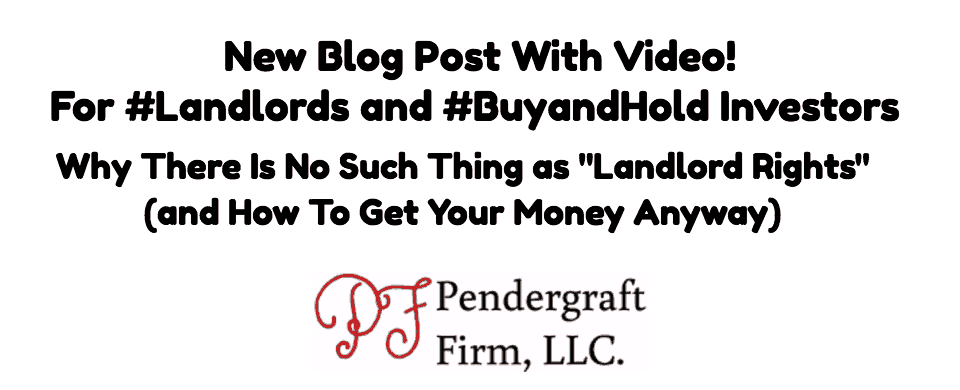By landlord rights most landlords mean the ability to (1) collect unpaid rent (2) recover damages caused by a tenant and (3) to evict tenants. Most landlords believe that these rights are inherent and that they do not have to do anything to obtain these rights, akin to freedom of speech or the right to vote. I am afraid this is not the case, and many landlords have lost thousands of dollars because they believed this to be. In the Landlord-Tenant relationship, the only party with inherent rights is the tenant. American Courts have decided long ago that tenants need protection from slumlords, so in a sense every landlord is a slumlord unless they can prove otherwise. (While tenants are angels deserving of protection). Landlords must be pro-active to obtain their “rights”. Rights is in quotes here because a right is something that does not have to be earned, which is why I say there is no such thing as landlord rights. However, if you set up your landlord business properly you will be able to earn all of the abilities that come with “landlord rights.”
How To Obtain The Right To Collect Unpaid Rent
Have a Written Lease Agreement
Remember by default you are treated as a slumlord and your tenant is treated as an angel. So what happens if you have an oral lease agreement and you claim rent is x amount and your tenant claims rent is y amount? The angel is believed. Thus in order to rebut this presumption you need a written lease agreement. In fact in my jurisdictions (Primarily Prince George’s County, Montgomery County, Charles County & Washington, D.C) you’re not allowed to file for failure to pay rent without a written lease agreement except under very limited circumstances. These limited circumstances only apply to a very small percentage of landlords so do not count on them applying to you. And even if you could file for failure to pay rent without a written lease agreement, the angel is believed. So get a written lease agreement.
Get a landlord license
Next, you need to have a landlord license if your jurisdiction requires it. Chances are your jurisdiction requires you to have a license to collect unpaid rent. Practically everytime I go to landlord-tenant court I watch a landlord have his or her unpaid rent case dismissed in open court because they failed to present a license.
Keep Accurate Records
Lastly, a landlord must prove any amount he claims the tenant owes with accurate book keeping generally shown through a rental history ledger. If the landlord cannot produce written records, he’s assumed to be a slumlord and the angel tenant owes nothing.
How To Obtain The Right To Recover Damages Caused By A Tenant
Keep Accurate Before and After Inspection Records
Remember, by default you’re a slumlord and your tenant is an angel, so if it comes down to just your word against your tenants, the angel prevails. So how do you obtain the right to recover damages caused by a tenant? Documentation. Landlords must document (1) the before and after conditions of the property with walkthrough and inspections and (2) keep receipts and repair estimates to show the court. Without a properly done walkthroughs landlord has nothing to measure the alleged damage against. And as far is the court knows you’re a slumlord and rented out the place in that condition. In addition, without documented repair costs and estimates, and court will not grant you any damages.
Proper Use of Security Deposit
A landlord can use a security deposit to recover from damages caused by a tenant, after all that what it’s for. However many landlords do not know how to handle security deposits. I recently settled a security deposit case for a large amount against a landlord because he did not follow the security deposit rules to the T. Security deposit rules are very strict. I elaborate more on security deposit rules in my jurisdiction here.
How To Obtain The Right To Evict a Tenant (or squatter)
Landlords Must Go To Court To Evict Tenants
Once again, landlords must be pro-active to obtain the right to evict tenants and can only obtain this right via court order from their local landlord-tenant court. In Maryland, there are four causes of action (ways) to evict tenants and squatters. Each with their own elements that must be proven. They are:
More Helpful Information From a Landlord Rights Attorney
I hope this overview helped. I cover all of this and more in my book Planlord – The Landlord Primer.
Planlord is a book I wrote based on experience to help landlords avoid the pitfalls that cost them thousands of dollars. I also have a facebook group anyone can join – Planlord – Legal Information For Landlords, a community for landlords and buy and hold real estate investors anyone can join to ask questions and help each other. Feel free to contact me directly at the contact info. in my bio.
- How Can I Evict An Employee or Caregiver I Fired That Refuses to Leave in Maryland? - February 6, 2023
- Can A Tenant Leave Property Before The Lease Agreement Expires in Maryland? - January 29, 2023
- Can I Be Evicted or Locked Out By My Wife, Husband, Boyfriend, or Girlfriend in Maryland? - January 28, 2023


Facebook Comments